Alex has been working with us for about a year. We helped him to write a book – and he’s already planning the next one.
Alex is in his early 70s, and had never written a book before. However, when the idea came up during a call with his Support Coordinator, he was interested. Alex says, “I knew I had enough stuff to say, but I just wasn’t sure I was ready at that time.”
Alex decided to go for it, and the book was recently printed. It’s called ‘Priests Don’t Dae That’. It’s about Alex’s life, mainly his childhood in the 1960s. He wrote it with the help of Lea Taylor from the Book Whisperers. The Book Whisperers help people to write books.
The writing and editing process worked well. Alex explains: “I’d put pen to paper, and then I would meet up with Lea and give her my pages. She would then put it all together for me. And she designed the book cover for me too.”

It took Alex just a month or two to write the book: “Once I started writing, it came quite easily.”
Lea really enjoyed the process too. She told us “It was a joy working with Alex on so many fronts.” Lea told us how dedicated Alex was to writing his book. She said that “best of all was witnessing such a wonderful change in him as the work and his confidence progressed.
His story was fascinating, and I’m delighted to have helped Alex produce this powerful piece of work.”
The people at the Book Whisperers believe that just the process of writing a book can make you feel better about things, and that was true for Alex: “It was a great experience. I wish that I got it all out sooner, honestly, but I’m glad I have done it now, and I’m now more level-headed. I’m very thankful to Future Pathways and to the Book Whisperers.”
And what’s next for Alex? “I might write another couple!”


Dan Ross is a transformational life coach, helping people to move towards their goals using the resources and relationships they already have. As Dan says:
“My work is all about working in the here and now, and making a plan for the future.”
He has developed a programme called “Ignite Your Inner Warrior.” The programme is about helping people to discover their inner potential.
Previously Dan was a counsellor, working in crisis settings. This gave him a wealth of experience of working with people in challenging life circumstances, which he is able to apply in his current role as a life coach.
The process
Dan works with people from a wide range of backgrounds and life experiences, and feels that it is important to treat everyone equally. Central to Dan’s work is developing a mutual, trusting relationship with people so that they can work effectively together.
The process starts with a free session before starting to work together. During this session Dan meets the person he will be working with, and together they explore if life coaching is right for them. They also talk about how they will work together. Dan finds this helps people feel less anxious about it.
During sessions, Dan works with people to become more aware of their limiting beliefs. A limiting belief is a state of mind which can block someone from moving towards their goals. Sometimes people are not aware of their limiting beliefs.
By helping people see these blocks, Dan helps people transform their beliefs about themselves into more positive ones. Dan encourages people to identify values they wish to develop and embody. He says:
“The values you choose should be the opposite of your limiting beliefs. For example, if you struggle with people pleasing, one of your values could be assertiveness.”
Dan supports people to master their values and make them part of their identity and everyday life. He helps them to reframe their thinking and find new perspectives on challenges. This can help people to feel more able to work through self-criticism, and to feel more in control of their life.
Dan also runs a free mindset group for people he works with. People in this group attend events and workshops, and take part in challenges like cold water exposure, climbing mountains, or even free-falling.
Working with Future Pathways
Dan heard about Future Pathways when a Support Coordinator, Andrew, called him to enquire about his services. Andrew was working with someone who wanted to explore how life coaching could help him achieve his goal of becoming a motivational speaker. Dan describes his experience of working with Future Pathways:
“It has been first class. The Support Coordinators have been personable and positive. I have had no communication issues at all. Any questions I had were quickly answered.”
Dan believes that life coaching is most impactful when people are ready to commit to change in their life, and he feels that everyone Future Pathways has connected him with has been ready to work together.
He also encourages the people he works with to stay connected with Future Pathways, and to share how they are doing with their Support Coordinator. This helps Dan work alongside Future Pathways to help people achieve their goals.
Impact
Many people who Dan has worked with have achieved things that might have seemed impossible before their work together. For example, some people have started businesses or overcome fears to complete personal challenges. Some people tell Dan that his coaching has changed their life. It’s clearly a very successful partnership, which we hope will continue and develop for many years to come.
Find out more about Dan’s work at www.danrossmotivation.co.uk
Pat has been working with us for about a year and a half. He wanted to share his experience of working with Future Pathways.
How long have you been working with Future Pathways?
About a year and a half now.
How did you find out about us?
It was a friend. He got me to go to Wellbeing Scotland, and they told me about Future Pathways.
How has Future Pathways helped you?
Well, I didn’t really have much self-confidence and stuff. My Support Coordinator helped me to learn to ask for help. It’s a thing I found hard before, because of the way I’ve been brought up in life: basically, help always cost me something.
How did you manage to make that change?
One of the first things my Support Coordinator did is she got me a laptop: it’s a type of thing I would never spend money on just for me. She got me to understand that I’ve got to look out for me as well. And in the long run, that will help everybody else.
I found it great just sitting on the laptop. I like to learn, but I never had the confidence to learn and I was never encouraged. A website about photography came up. Years and years ago, I had a small camera and I loved it. I would just go out and walk and take photos.
So Future Pathways helped me get a camera, which helped me. It gave me a reason to get out there and do something just for me, basically.
How is life different now?
It’s definitely different. See the name Future Pathways? It’s like before, my pathway was always leading around about and coming back again, but they helped me make a different pathway, which has opened up the inner belief in me. I can do this, I can take photographs, I can do whatever.
I’m going to start a writing course in a couple of weeks, and that’s something I would never have even considered. I’ll be nervous! I’ll be uptight still, but I’ve got the belief to try it.
It’s great that you’ve got more self-confidence and you believe in yourself…
A while ago, my boy got me and my partner a Christmas present: a flight to Dublin. I never used it, because I didn’t have the confidence. But Future Pathways helped me, so I went for it, me and my partner. It’s the first time that we’ve been on a plane. I’m over 50 years old, and it was the first time I was on an aeroplane, the first time I’d looked at the clouds from the other side.
It was only a short flight, but it’s something I would have never attempted, never thought about. But now I know I can do this. It’s the simple things in life, that other people take for granted… they’re the most important things for me.
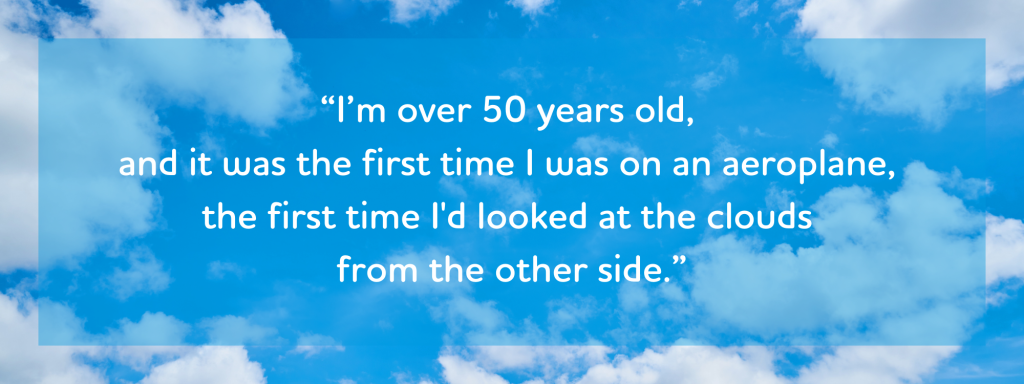
We work with Matter of Focus to help us evaluate the difference we make and see how we can improve. We spoke to Ailsa Cook, Co-Founder and Director of Matter of Focus.
Can you tell us a bit about Matter of Focus and the work you do?
Matter of Focus is a purpose-led company and B Corp based in Edinburgh set up by myself and co-founder Sarah Morton in 2017. We support public and third sector organisations to understand, evaluate and track the difference they make.
Sarah and my paths had crossed several times during our long and established careers in academia, where we had both kept one foot firmly planted in the real world of influencing policy and practice. We both really knew that organisations needed better tools to evaluate their own impact, tools that would empower them to learn in real time thereby deepening their understanding of their work, which is what’s required to really make the best difference possible. So that is what we set out to provide.
Matter of Focus offers a practical and meaningful approach to understanding and evaluating change, along with expert support, and we have developed our own software OutNav to hold the approach and help organisations embed ongoing self-evaluation, learning and improvement.
How have you worked with Future Pathways so far?
We’ve had the pleasure of working alongside Future Pathways since 2018. They were aware of my expertise around evaluating personal outcomes and approached Matter of Focus when they were looking for support with their evaluation and research, which they knew was an important part of their work to build the evidence base for a new and pioneering service.
Initially, we produced a scoping report to really understand the service; looking at the context in which Future Pathways was working, understanding how they make a difference and their progress towards that. This involved speaking to people that used the service as well as staff and other partners. Since then, we provided ongoing support and supervision for Future Pathways’ researcher as they were using OutNav to embed evaluation into their work.
In 2020 we helped Future Pathways to produce their own impact evaluation, which was a substantial piece of work that mapped out how the service made a difference and brought together lots of feedback, data and evidence from across their work.
Recently we’ve been working very closely with the Impact and Evaluation Lead to supplement the information they had available to evaluate the impact of Future Pathways. This included running focus groups and workshops and doing some additional analysis. We see ourselves as a learning partner for Future Pathways offering a bit of additional input at key points.
We recently worked together to develop the Stepping Stones report. What can you tell us about the importance of collaboration when evaluating impact?
We believe it’s important for organisations to own their own evaluation: that they are clear about what they need to know and what their data is telling them and, critically, that people in the organisation are really involved in making sense of that data because that’s what leads to meaningful and efficient learning and improvement. However, we recognise that evaluating complex relational services is incredibly challenging. We have been able to bring specific expertise, guidance and an approach to evaluating complex interventions. With Stepping Stones, we were also bringing objectivity: people could tell us things they might not tell Future Pathways directly and we can see the service with a bit of distance and fresh perspective. Coupling this external lens with Future Pathways’ ongoing self-evaluation over quite some time is really powerful.
What did we learn together about Future Pathways’ impact in Stepping Stones?
This evaluation has cemented understanding of how Future Pathways makes a difference. We can be confident that their genuinely trauma-informed and relational approach to care coordination works and makes a difference to people as, building on previous evaluations, the evidence is now clear.
Additionally, the Stepping Stones report has strengthened understanding about Future Pathways’ role within the wider system and the impact they have had by working closely with Delivery Partners to make sure they’re able to support people effectively. They really understand what they need to do next to shape the system.
Future Pathways’ commitment to understanding the difference they make and their focus on embedding and sharing ongoing learning is inspirational and exemplary. We’re proud of our learning partnership.
Our latest Quarterly Report is now available to view. It covers our work from January to March 2023. It shows what we’ve learnt, and includes key stats and feedback from those who access Future Pathways.
This quarter:
28 people started working with a Support Coordinator.
More people heard about Future Pathways through word of mouth than from anywhere else.
259 people accessed support from our delivery partners.
We worked with 70 active delivery partners.
People told us they wanted to improve their mental health, their living environments and develop new skill.
People told us working with Future Pathways made a positive difference to their lives. For example, by giving them sense of pride in themselves or their achievements, and ways of coping.
People told us where they heard about Future Pathways
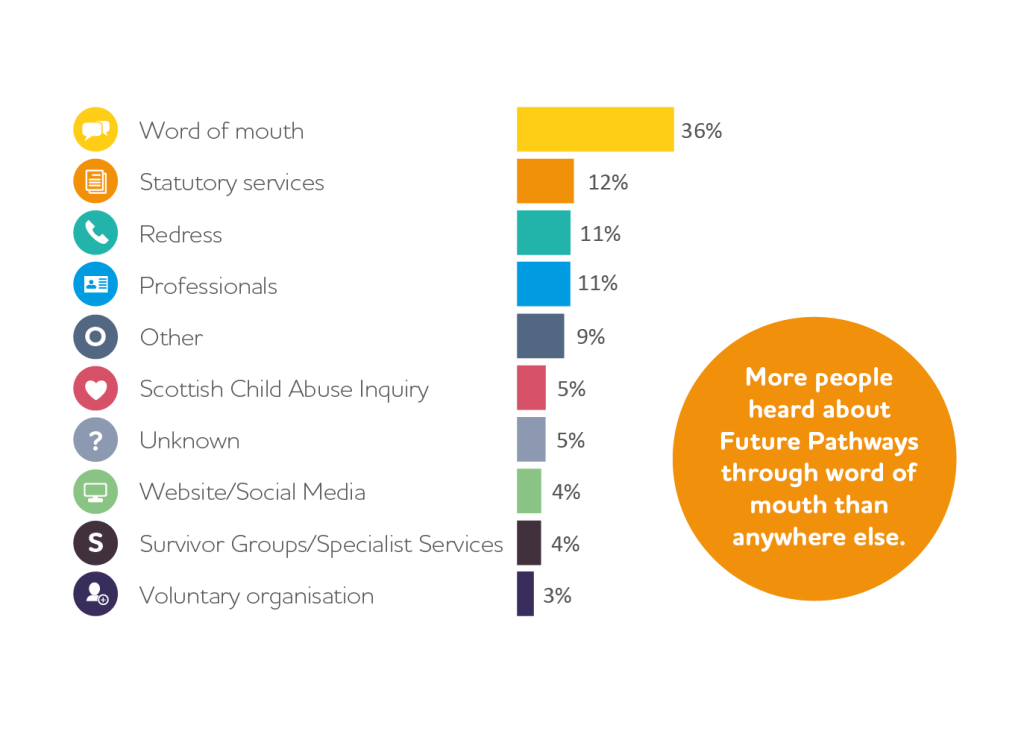
Future Pathways linked people with a range of delivery partners this quarter
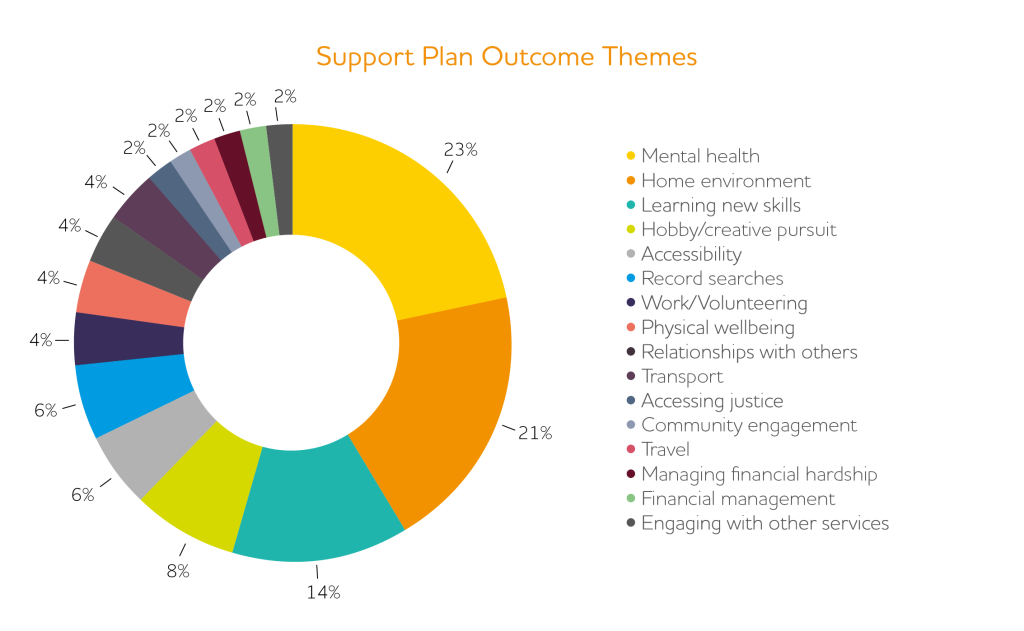
People told us what they hoped to gain from working with our service
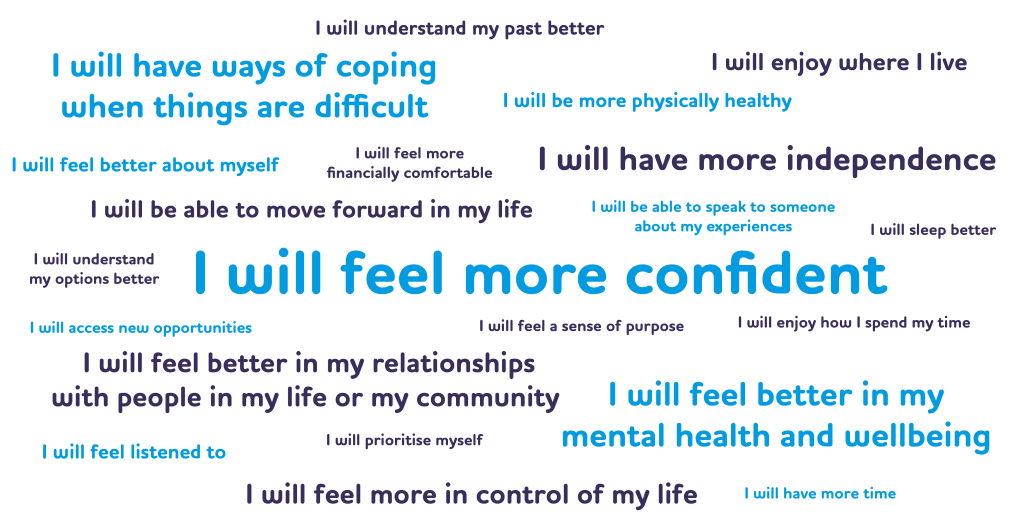
People told us about the most impactful support they accessed through Future Pathways
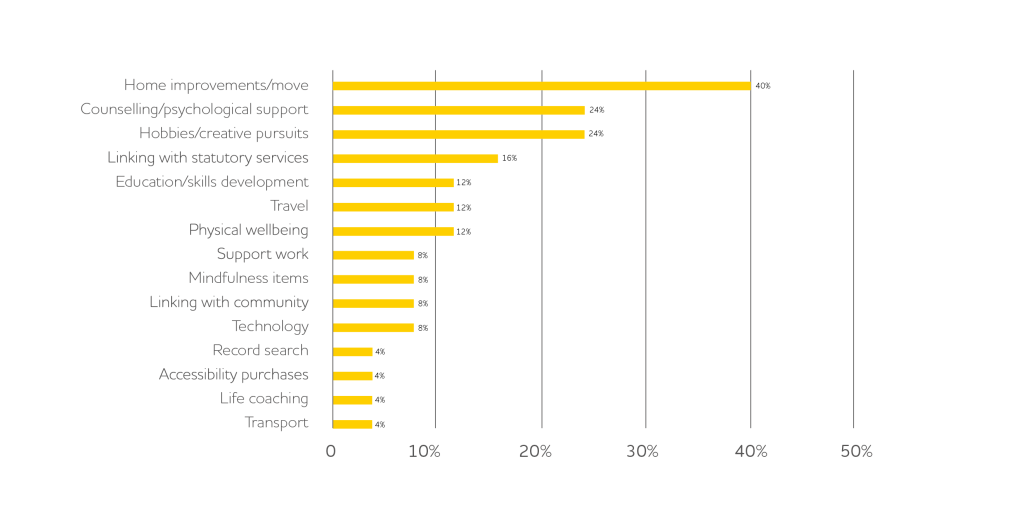
Our full report features further infographics, feedback and a breakdown of our financial spend. Read the full report.
Rikki heard about Future Pathways in 2017, after contributing to the Scottish Child Abuse Inquiry. He started working with a Support Coordinator called Lara.
Rikki had been struggling with his mental health and particularly with flashbacks. Lara put Rikki in contact with the Anchor, the Glasgow Psychological Trauma Service. Through the Anchor, Rikki accessed EMDR therapy. This is a type of therapy which can help people process trauma. Rikki found that this experience helped him to look at past experiences from his present perspective, as an adult. Together Rikki and Lara also explored how complimentary therapies, such as reiki and mindfulness techniques, could benefit his mental health. This helped Rikki find useful approaches to cope with flashbacks.
“I used to see one wee thing on the TV and I was back there in my mind. Now I have the techniques so that the flashbacks don’t stay with me.”
Volunteering has always been important to Rikki. For example, during the COVID-19 pandemic, Rikki volunteered to meet and greet people at his local hospital. After accessing support from Future Pathways, Rikki wanted to do something to support Future Pathways.
“You looked after me. You have got me to this stage. Now I want to give something back. I want to share what Future Pathways has done for me.”
Lara encouraged Rikki to get involved with Making Pathways Together. Through this project, people who have accessed support from Future Pathways gave us feedback to help us improve the service. Rikki also got involved in our survivors’ voice group, Voices for a Better Future. This group brings together people who are registered with Future Pathways with the aim of improving services for other survivors.
Currently, Rikki and other group members are working with Future Pathways to develop peer support within our service. Although at first Rikki felt hesitant to get involved in the group, being part of Voices for a Better Future has helped him feel more confident and helped Rikki move past feelings of shame and embarrassment that have affected his past relationships.
“It has given me a lot of confidence. My life experiences are what I bring to the table.”
Being part of this group has also helped him develop relationships with people who also want to make a positive change.
“We became closer as a group. The respect is there. […] It is all about helping others […] We laugh together. Sometimes there’s a bit of emotion. People want to be heard. I can’t advise but I can sit there and listen.”
Overall, being involved with Voices for a Better Future has been a very fulfilling experience for Rikki.
“Just being at the meetings, I know I am there for the right reason, to make people realise that they have a voice […] I feel passionate about Voices for a Better Future. There are a few tears, but we are doing it to better people’s lives.”
Future Pathway’s latest impact report, Stepping Stones, is now available. Starting with the launch of the service in 2016 and ending with our latest findings from 2023, the report shines a light on the difference we have made and, crucially, how we make it.
Commissioned by Future Pathways and created in collaboration with Matter of Focus, the report finds that our work has a positive impact on many people’s lives. By November 2022, almost 2200 people were registered with Future Pathways. Of these, 1500 had been supported by the service and around 1000 people were actively receiving support.
The report tells the story of Future Pathways at scale. It weaves data about our service along with feedback, reflections and accounts of people’s experiences. This report aims to amplify the voices of those we support, our partners and our staff.
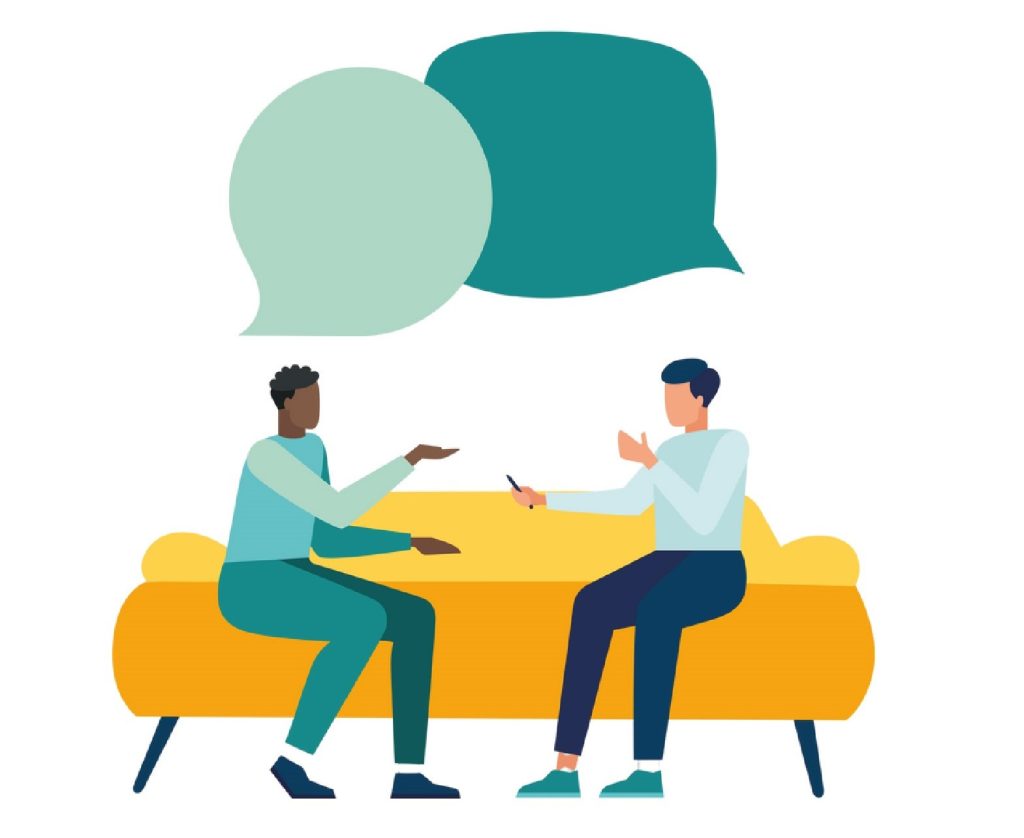
It is not just what we do, but how we do it, that makes the difference.
The Stepping Stones report reflects that Future Pathways has made a difference to the lives of people we support. Many people say they feel cared for, seen and understood. Many have shared that they gained the knowledge, skills and confidence to make changes in their lives. Evidence shows that our holistic, person-centred approach is crucial in contributing to positive changes.
The report also highlights the importance of our relationships with wide-ranging Delivery Partners and other existing services. People we support access a mix of resources from different services. The impact of this holistic, tailored support cascades into many areas of an individual’s life. The report also highlights how we bridge the gaps people experience when accessing services to which they are entitled. For example, through advocacy or empowering people to independently access services.

Multi-faceted support can bring multiple impacts
The report also situates our work within the broader landscape. For example, the cost-of-living crisis has led to more people accessing financial support for unexpected costs related to their basic needs. We can also see that people face barriers when engaging with support, since focusing on longer term outcomes can be challenging when experiencing immediate financial pressure.
The findings also highlight the strengths and gaps in our data. Due to the secretive nature of childhood abuse, and the lack of data about survivors in Scotland, there is a gap in our knowledge about survivors more broadly. We are keen to develop a more detailed picture of the demographics of the people we support. This would allow us all to better adapt our services in response to the impacts and inequalities of childhood trauma.
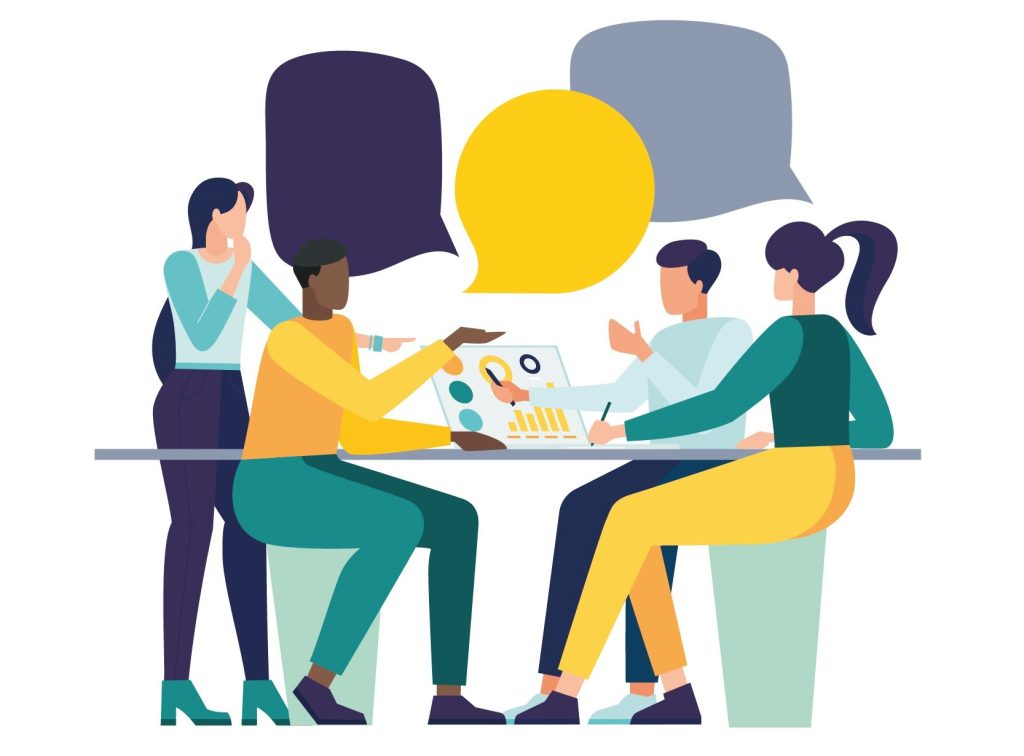
We hope our findings create the potential for lasting and tangible difference.
Ultimately, this report is a story of change. The demonstrable impact of trauma-informed practice calls for other services to adapt and provide compassionate, flexible support for survivors of past abuse. It is also about change in support itself: we see the importance of adapting and tailoring support as needs evolve. And, most importantly, it is about change for the people we support. For many individuals, the right support at the right time can be the first steppingstone on their future pathway.
”Our goal is to strengthen the supports available to people with lived experience of abuse and neglect. The importance of relationships to achieving tangible outcomes for people and communities cannot be overstated. We are learning more about how change happens and hope our learning, practices and service model informs and encourages wider change in the system.”
Flora Henderson, Alliance Manager, In Care Survivors Alliance
“Matter of Focus has been a learning partner to Future Pathways since 2018 and we feel honoured to work with an organisation that cares passionately about understanding the difference they make as well as embedding and sharing learning. Evaluation is never easy and requires bravery and transparency. It’s all the more important and laudable given the complexity and sensitivity of the work that Future Pathways undertakes.”
Simon Bradstreet, Principal Evaluation Consultant, Matter of Focus
